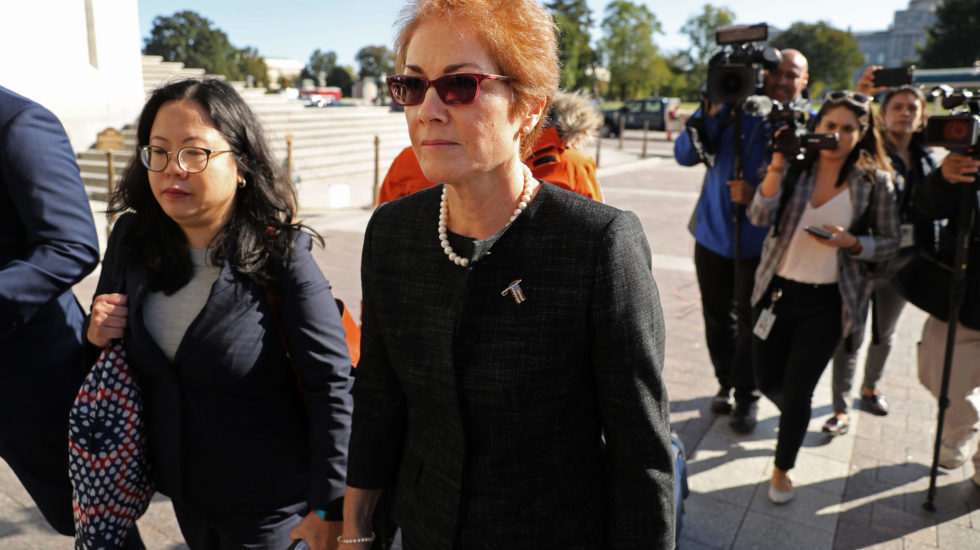The committees that heard testimony on Ukraine are beginning to release transcripts. The first two made public are from U.S. ambassador to Ukraine, Marie Yovanovitch and former top adviser to Secretary of State Mike Pompeo, Michael McKinley. Along with the announcement came the statement “It’s time for the American public to see the evidence for themselves.”
Here are some key passes from Yovaovitch’s testimony.
The committees say this excerpt cites an exchange from February 2019, “after communicating with Rudy Giuliani about Vice President Biden and the 2016 election, Ukrainian Minister of the Interior Arsen Avakov expressed concerns to Ambassador Yovanovitch that ‘getting into U.S. politics’ would be ‘a dangerous place for Ukraine to be.’”
Q: What were his concerns as expressed to you?
A: He thought it was—so he thought it was very dangerous. That Ukraine, since its independence, has had bipartisan support from both Democrats and Republicans all these years, and that to start kind of getting into U.S. politics, into U.S. domestic politics, was a dangerous place for Ukraine to be.
Q: Why did he think he would be getting into U.S. domestic politics by speaking with Mr. Giuliani?
A: Well, because—well, he told me that, but because of what you had mentioned before, the issue of the Black Ledger. Mr. Manafort’s resignation from the Trump campaign as a result. And looking into that and how did all of that come about; the issue of whether, you know, it was Russia collusion or whether it was really Ukraine collusion, and, you know, looking forward to the 2020 election campaign, and whether this would somehow hurt former Vice President Biden. I think he felt that that was just very dangerous terrain for another country to be in.
Yovanovitch also says at one point Gordon Sondland, the U.S. Ambassador to the European Union, recommended she publicly praise of Trump.
A: He said, you know, you need to go big or go home. You need to, you know, tweet out there that you support the President, and that all these are lies and everything else.
Q: Did he actually say, “support President Trump”? Was that his advice, that you publicly say something to that effect?
A: Yes. I mean, he may not have used the words “support President Trump,” but he said: You know the President. Well, maybe you don’t know him personally, but you know, you know, the sorts of things that he likes. You know, go out there battling aggressively and, you know, praise him or support him.
And some key elements from McKinley’s testimony can be found here.
In one passage Ambassador McKinley raises concerns about how he believed the State Department was trying to dig up dirt on a political opponent.
Q: I think you’ve also said that part of the reason why you decided to resign was that you couldn’t be blind to what was happening, and what was happening was efforts to use the State Department to dig up dirt on a political opponent. Is that fair as well?
A: That is fair. And if I can underscore, in 37 years in the Foreign Service and different parts of the globe and working on many controversial issues, working 10 years back in Washington, I had never seen that.
Q: How many conversations did you have with the Secretary about this matter?
A: Three probably. And the subsequent ones were in the context of—because, if I can remind, I presented my resignation on Monday, September 30th. So it wasn’t very long after the initial conversation. And in presenting my resignation, I made clear that I was looking to leave the Department, I wasn’t looking to create any news story out of it, but that he should be aware that, of course, part of the reason, people were very aware that I was concerned about what I saw as the lack of public support for Department employees.
A: So I presented my resignation on September 30th. I spoke with the
Secretary again when he called from Europe to discuss my resignation. And I think that at that point I said, well, you know, we really—I was pretty direct. I said, you know, this situation isn’t acceptable. We need to—you know, I’ve already made my recommendation, but I do—I am resigning. And that was the conversation. Again, I didn’t get a reaction on that point.
